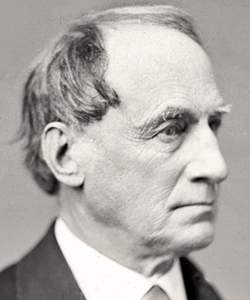Caleb Cushing (Congressional Biographical Dictionary)
Reference
CUSHING, Caleb, a Representative from Massachusetts; born in Salisbury, Mass., January 17, 1800; was graduated from Harvard University in 1817; studied law; was admitted to the bar at Newburyport in 1823; member of the State house of representatives in 1825; served in the State senate in 1827; again a member of the State house of representatives in 1833 and 1834; unsuccessful candidate for election to the Twenty-third Congress in 1833; elected as an Anti-Jacksonian candidate to the Twenty-fourth and reelected as a Whig to the Twenty-fifth, Twenty-sixth, and Twenty-seventh Congresses (March 4, 1835-March 3, 1843); chairman, Committee on Foreign Affairs (Twenty-seventh Congress); was not a candidate for renomination in 1842; appointed by President Tyler as Envoy Extraordinary and Minister Plenipotentiary to China on May 8, 1843, and also commissioner on the same date; resigned March 4, 1845; while serving as commissioner to China was empowered to negotiate a treaty of navigation and commerce with Japan; again a member of the State house of representatives in 1845 and 1846; colonel of a Massachusetts regiment which served in the war with Mexico; appointed brigadier general by President Polk April 14, 1847; unsuccessful Democratic candidate for Governor in 1847 and again in 1848; again elected to the State house of representatives in 1850; offered the position as attorney general of Massachusetts in 1851, but declined; mayor of Newburyport, Mass., in 1851 and 1852; appointed judge of the supreme court of Massachusetts in 1852; appointed by President Pierce as Attorney General of the United States on March 7, 1853, and served until March 3, 1857; chairman of the Democratic National Conventions at Baltimore and Charleston in 1860; appointed by President Johnson as a commissioner to codify the laws of the United States and served from 1866 to 1870; instructed on November 25, 1868, in concert with the Minister Resident to Colombia, to negotiate a treaty for a ship canal across the Isthmus; appointed in 1872 by President Grant counsel for the United States before the Geneva Tribunal of Arbitration on the Alabama claims; nominated by President Grant in 1874 to be Chief Justice of the Supreme Court of the United States, but was not confirmed by the Senate; Envoy Extraordinary and Minister Plenipotentiary to Spain from January 6, 1874, to April 9, 1877; died in Newburyport, Essex County, Mass., on January 2, 1879; interment in Highland Cemetery.
“Cushing, Caleb,” Biographical Directory of the United States Congress, 1774 to Present, http://bioguide.congress.gov/scripts/biodisplay.pl?index=C001016.




